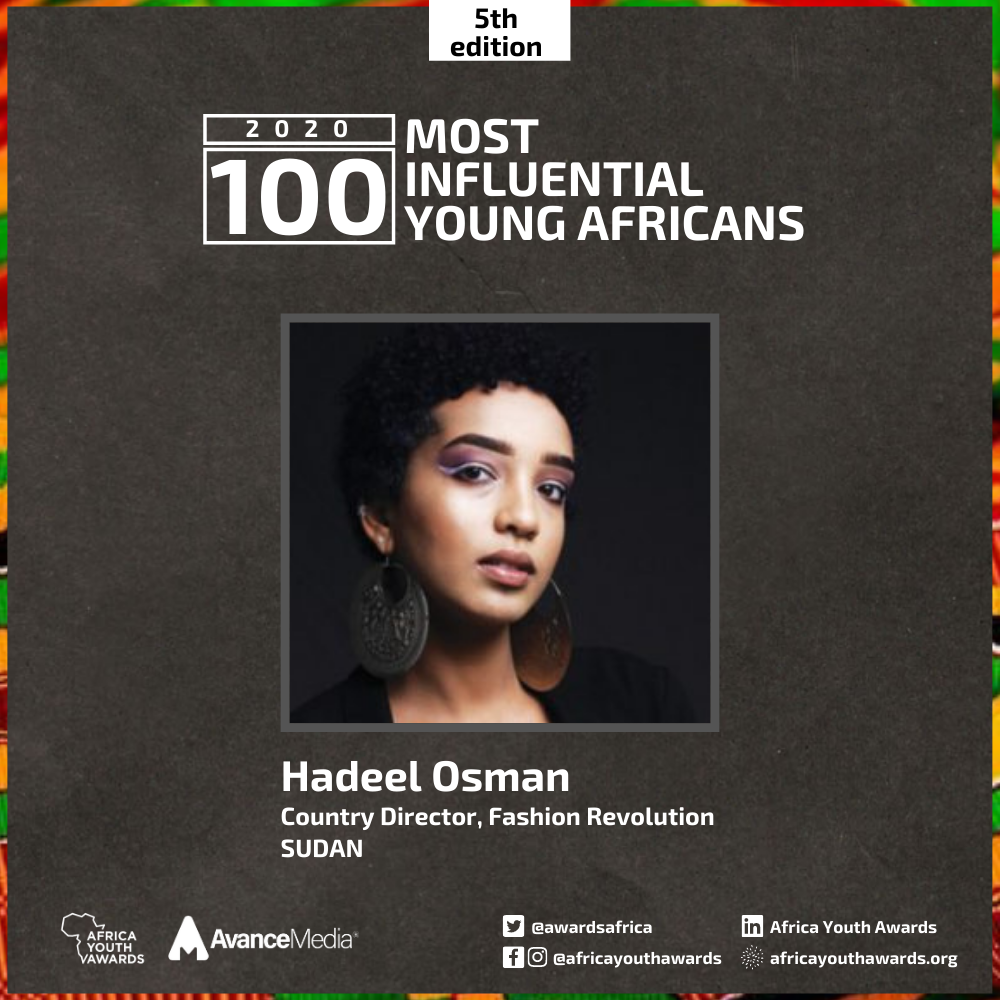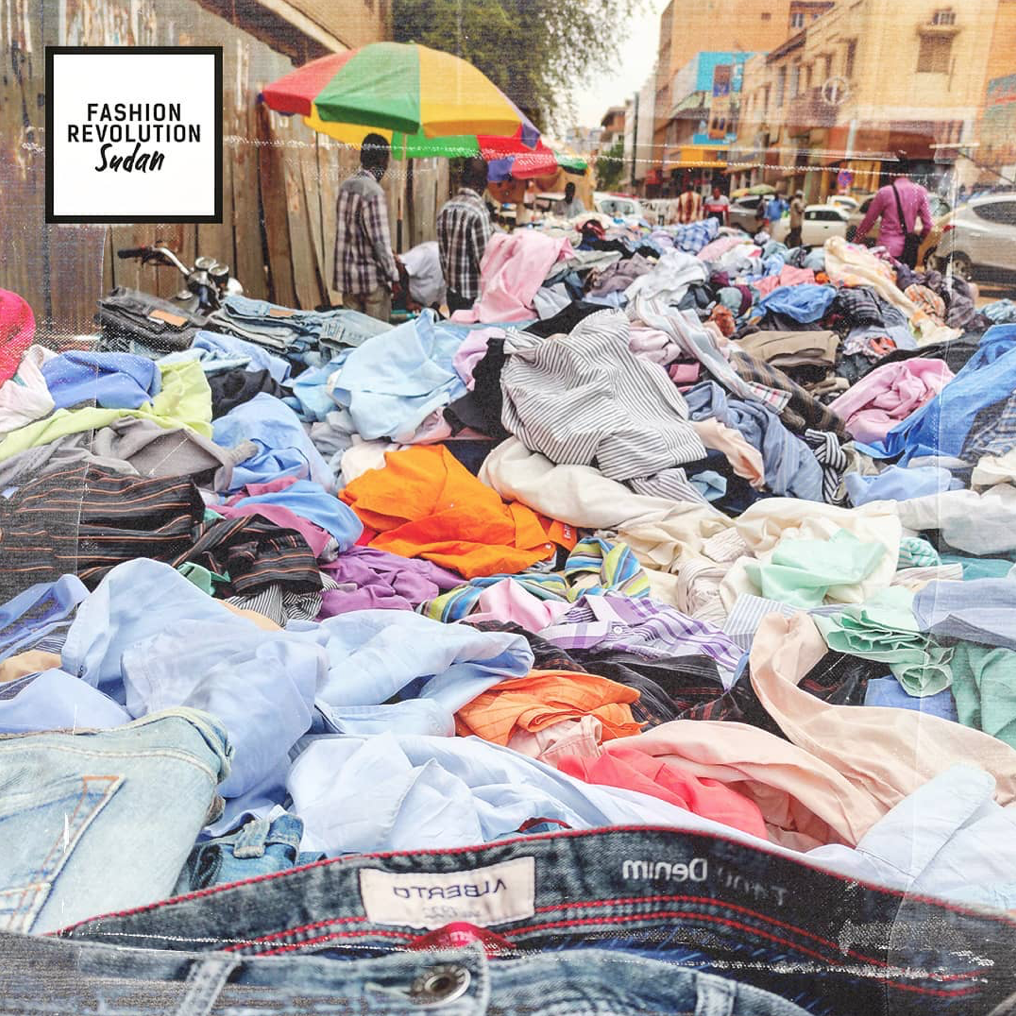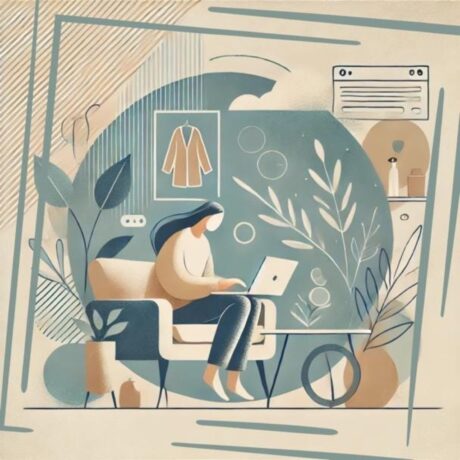Fash Rev Sudan’s Hadeel Osman is Named 100 Most Influential Young Africans
When Fashion Revolution began in 2013, we brought together a group of passionate individuals mainly based in the UK, but it was clear that the campaign for a fair and transparent industry had global relevance. From the early days, we’ve relied on a brilliant network of global volunteers, who helped to shape the open source framework and build country teams on every continent. One of those wonderful people is team Sudan leader, Hadeel Osman. Recently, Hadeel was recognised by the Africa Youth Awards as one of the 100 most influential young Africans. Below, we catch up with Hadeel on her journey with Fashion Revolution.
@Fash_Rev: Congrats Hadeel! Can you tell me a little bit about yourself and your work outside of Fashion Revolution?
Thank you so much! I’m the founder and creative director of DAVU Studio, which is a multidisciplinary creative and design studio. Coming from a visual communication, styling and marketing background, it was only right to put all the experience I’ve gained in the past 8 years into a business that provides a wide range of visual services and consultation for clients in Sudan, across Africa and the world. I’m also very passionate about the inner workings of the fashion industry and seeing the development of it unfolding throughout the African continent, which has influenced my desire to start designing clothes and made me take a deep dive to research and further understand how things operate, the possible future of the regional industry and the creative growth that we are witnessing.
@Fash_Rev: Prior to your work with Fashion Revolution, you’ve been an ambassador for Slow Fashion Movement. What’s this about?
I’ve been incorporating slow fashion ethics into my personal life for a few years now and earlier this year I stumbled upon the 3-month campaign to refrain from fast fashion, educate the masses all while supporting local businesses who were suffering from the consequences of the pandemic. I was more than happy to align myself with them to take the pledge and meet like-minded people on a global spectrum. I wanted to also spread the knowledge and awareness to whomever will listen, and was lucky to find two other Arabic-speaking ambassadors and since then we have teamed up and founded the Arabic Instagram page for the movement, where we create a variety of content to address slow fashion and sustainability from the perspective of the MENA region.
@Fash_Rev: When did you first become involved with Fashion Revolution? Can you tell us about starting a team in Sudan?
I discovered Fashion Revolution on social media in 2015 when I had started educating myself more about the industry itself, aside from my overall love for clothes. Over the years, I would watch the highlights of the global events for Fashion Revolution Week, which made me wonder how amazing it would be to have a Sudan chapter and team. It was early this year when I decided to take a chance and contact the Fashion Revolution team to see if it was possible to make it happen. With Covid-19 forcing most events, talks and activities to be held virtually, I decided to go ahead and represent Sudan by hosting Fashion Revolution Week online via my company page. Luckily, it got a lot of positive attention and I was able to create local connections with fashion enthusiasts, designers, traders and creatives which really pushed me to make the move to make Fashion Revolution Sudan a reality.
@Fash_Rev: What are the attitudes towards clothing longevity like in Sudan?
It is simply the norm! Taking care of our clothes, be it ones that are worn daily or saved for special occasions is a part of our daily life. Sustainability is deeply rooted within our culture, one is expected to enhance the longevity of their clothes, pass them down, swap them with friends and family and also mend them when necessary. A t-shirt can stay and transform over the years, be it given to a younger sibling or eventually cut up into a rag that will then be used to clean the house. Shopping for new clothes is seen as something to do out of necessity, and the concept of retail therapy is rather foreign in Sudan – this is due to the economical situation and constant inflation, that affects all social classes. However, when it comes to special occasions (social gatherings, weddings, etc.) over the years, there has been a change in attitudes where outfit repeating is seen as something unacceptable particularly towards women. It is a visible shift in the mindset of the overall community, especially from what I have experienced in Khartoum, where not wearing something new (or at least new to one’s social circles) is seen as a sign of being unable to afford new things – which goes to show the amount of pressure that our patriarchal society puts on women to always look their best and compete for attention.
@Fash_Rev: You launched the hashtag #AfricaIsNotALandfill. Please tell us more! What should western consumers in Europe, North America and beyond understand about the impact of discarded clothing?
Having travelled and lived across a couple of African countries, including my own, over the past 3 years, has further exposed me to a variety of secondhand markets. As an avid thrifter and collector of vintage clothes, it seemed like a great way to find unique finds, however I started to raise some questions in my mind; ‘Where do these clothes come from?’, ‘Why are there so many of them?’, ‘Are the sellers truly able to sustain a proper living wage from selling them?’, and ‘What are the effects of secondhand markets on local garment production?’.
Doing some thorough reading and research, while also asking the sellers, I was able to find people online who were asking the same questions and looking for solutions. Most of these clothes either entered borders through charities, churches and factories, however they were mostly from overflowing containers of clothes coming from the Global North. This is essentially waste colonialism, because the idea that someone’s trash is someone else’s treasure is not feasible in a day and age where fast fashion has drastically changed quality of clothes production as well as consumer behavior. For people to be able to afford so many clothes that don’t last that long and sometimes in terrible shape, be it in Europe or North America, and to then bag them and donate them under the guise of wanting to help out someone less fortunate, is actually adding to the already vulnerable environmental state of the African continent. I believe that citizens of those parts of the world should really take a minute and think about the consequences of capitalism, their shopping behaviours and how conscious consumption needs to be reintegrated into their personal lives and their society. Sustainability is not a trend, it is a way of living for many of us, so its essential to say that our land is not a landfill and we do not need donations. What we need is economical and industrial liberation – so get involved and raise the conversation politically, so that fast fashion companies are truly held accountable.
@Fash_Rev: You are one of the 100 most influential young Africans – a huge achievement! You’ve also been recognised by Forbes Africa 30 under 30 list. What are your goals for Fashion Revolution Sudan in the year to come?
My goals for Fashion Revolution Sudan include facilitating the education of what the fashion industry means from our context. To also create an understanding of what is needed to have the growing scene become an actual industry that encourages the notion of “Made in Sudan” in a way that embraces the environment, gives marginalised communities the opportunity to contribute by creating job opportunities, highlights and boosts the economical and creative capacities of artisans and provides an avenue for many who love fashion but are unaware of what it truly entails and how they can be actively involved. We would like to host events in collaboration with local organisations, conduct workshops and motivate those who want to make clothes to do it ethically and sustainably, keeping in mind what the Sudanese consumer needs.
***
To meet more of the amazing people powering the Revolution, check out other issues of this interview series including our conversation with team Guatemala’s Alexandra Cerezo and team Brazil’s Fernanda Simon.










